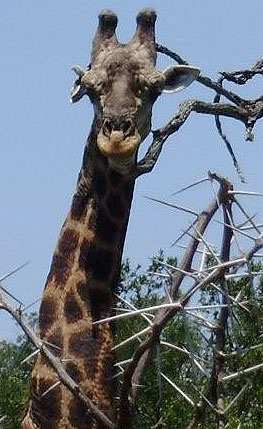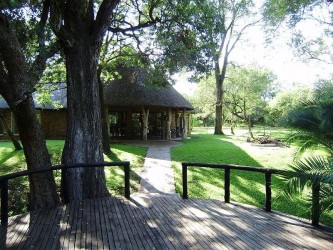
I managed a short trip to Swaziland last week. Just one night in Mbuluzi Game Reserve was enough to re-charge my batteries. It takes just an hour and a half to drive to the Swaziland border from Maputo, and 10 minutes beyond the border is this small, but beautiful, game reserve.
With over 300 bird species to see and none of the dangers of the Big 5, it’s a great place for walking and cycling to see the wildlife. My kids really enjoyed the freedom of being able to walk up close to animals. This giraffe, with its torn ear had a very expressive face!

The accommodation was also great, we stayed in this fantastic 3 bedroom chalet, booked just a few days before the trip. It was just a night away from Maputo, but enough to set me up for the focus of this week as we begin to gather information to evaluate the health improvements achieved in 2009.

6 comments
Comment by Sarah Brown posted on
It's interesting to read about what DFID staff get up to outside of their offices but I usually prefer to read about development-related issues instead of where they take their holidays. Is this really an appropriate post for the DFID website?
Comment by Neil Squires posted on
Hi Sarah
Tourism is an important driver of development, with the potential for both positive and negative benefits. Game parks and concessions such as the one I visited in Swaziland help to protect flaura and fauna that might otherwise be encroached by farming or threatened by deforestation. Tourism also has the potential to bring money in to the local economy. Thousands of football fans will decend on South Africa in the summer, many may choose to visit Mozambique and Swaziland during their stay. I hope through my blog to give those who are interested an insight into some development issues in the region, but for those who just stumble upon the blog through other searches I'd like to give an insight into what life is like in Maputo and Mozambique and what opportunities a visit here might afford. In previous posts, I have mentioned the beauty of the beach at Xai Xai and some of the attractions of Maputo. I sincerely hope that some of those who visit South Africa this summer will take the time to explore Mozambique and Swaziland and provide a welcome injection of tourist dollars into the local economy, ideally supporting those tourism opportunities which also help protect the local environment. So, what for me was a short trip to rest in Swaziland, I hope for others might provide an insight in to some of the potential that the sub-region has to offer.
Comment by Vinay posted on
Neil - Nice to hear what you are getting up to in & around Moz.
@ Sarah Brown - are you THE Sarah Brown, or A Sarah Brown? Either way, and with the greatest of respect, I really think you need to lighten up!
Please keep up the interesting blogging, Neil.
Comment by Rose S posted on
Hello Neil,
Stumbling upon your blog I have a feeling that we've met before.
It's most interesting to see what you and your family get up to in Mozambique and its bordering countries.
Thanks for giving us an insight into what there is to do!
Rose.
Comment by Simon Coupon posted on
I had the great pleasure of visiting Swaziland about 5 years ago, what an exotic adventure. It really left me in awe seeing all the wildlife and untouched nature around me. The poverty also really hit me on the drive in......
Quite a difference from my current life in Paris, and former life in New York. City life can really leave you feeling out of touch with nature, and also what it really means to be "poor". It certainly isn't the inability to buy and maintain an auto in Paris......
Comment by James posted on
Dear Neil,
This is a very interesting post. I fully agree with you that tourism is an important development drive, especially in Southern Africa. Yet those words ring hollow to an organisation such as DFID (yet thankfully not to all of its officials) that has chosen not to engage in this sector and incorporate it into its development strategy. Under the previous government, tourism was overlooked as a target sector, and it looks as though history is going to repeat itself as the coalition government and Andrew Mitchell appear to have no plans to revise this thinking in the future.
Tourism is -and always will be- a valuable source of revenue for national governmentswhich has an unrivalled potential to reduce poverty at the local level and enrich local communities with even a small ounce of cultural value. The linkages and indirect benefits to other sectors, such as agriculture, are significant and of course the financial benefits delivered by tourism will thus have numerous social benefits to local communities. This is not even to mention the fact that tourism itself is growing in Southern Africa and the issue of environmental sustainability must be addressed for the future.
It is very curious why tourism, a productive part of the economy, that does allow donors to see multiple returns on their investment, has been ignored like this. I would urge DFID to revisit this issue and consider the considerable benefits that could be reaped in the global South by undertaking small policy interventions in a multi billion dollar industry.